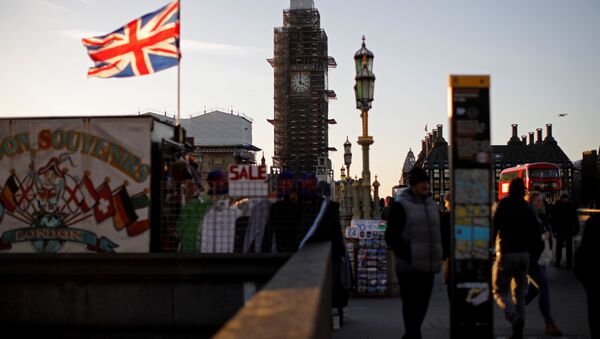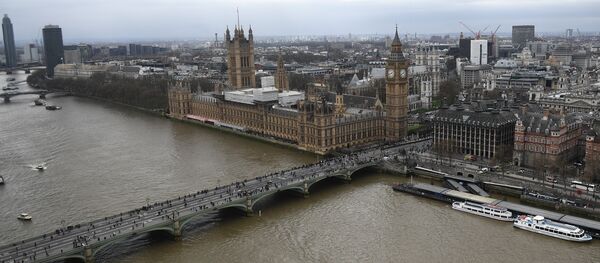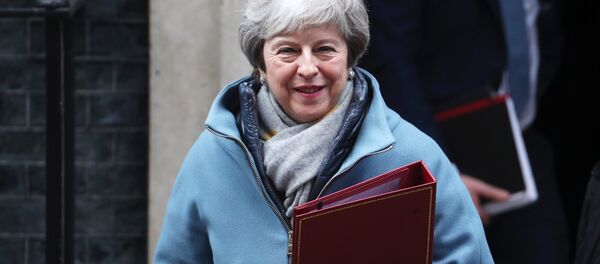Radio Sputnik has discussed possible alterations to the Brexit deal with Douglas McWilliams, one of the UK's leading economic thinkers and executive deputy chairman of the Centre for Economics and Business Research in London.
Sputnik: What alterations could we expect from the upcoming vote in the House of Commons?
Sputnik: Do you think that the EU is going to change their stance on that issue? Ireland has also been quite firm, saying that they don't expect any changes to that arrangement and they don't want a concrete border, obviously, because I think that Ireland and the UK both agree that that would really jeopardise the peace process, wouldn't it?
Douglas McWilliams: I don't think anyone wants to see "a concrete border". I mean I have got some related knowledge in this because my grandmother was born a mile from the border and I know the area moderately well, because of the family connections. No one wants to return to military posts on the border or anything like that.
READ MORE: Gov't Will Seek to End Free Movement in No-Deal Brexit Scenario — UK Home Office
They would just be a red rag to a bull, they would be provocative and we would end up, I am sure with a renewal of violence if this happens. So no one wants it. But there are plenty of ways that go beyond forcing the UK effectively not to leave the customs union that would lead to the results that there is no border, there are plenty of electronic means and things I that.
So I think there are ways of solving this problem. This is not an impossible problem, and to some extent, they were solved by the agreement with the previous Irish prime minister of the Taoiseach Enda Kelly, who pretty well had sorted a deal. The current Taoiseach tore it up and started being rather more disruptive and putting a lot more pressure on the British. I think we are going to have to go back to something closer to what the previous Taoiseach had agreed.
I am not sure if the technology is available readily and at what cost would that come? Then you still have this whole situation where previously you would have things entering from various borders and now have a funnel created where you have a huge amount of goods entering through the Irish border.
Douglas McWilliams: I think that actually, it doesn't need to be anything like as complex as that, for two reasons. First of all, actually a large part of border control, both the Irish border and the borders of the UK, are already handled electronically: about 70 percent of the goods that come into the UK go through electronic scanning. They don't actually get physically looked at in this at all.
READ MORE: Brexit Latest: Boris' 'Freedom Clause' & Second MP Vote on Brexit Deal
So I mean, there is quite a lot of misinformation being put around on this. Secondly, there is a de minimis rule. I mean the cattle that wander across the border and often trying to pick up two sets of EU subsidies when it goes from one side to the other — that is going to continue to happen; obviously if the UK is outside the EU they won't get two sets of EU subsidies anymore, but that is not a big problem.
Certainly, within five years I would expect most of the world trade to be covered by blockchain-based solutions. And then they will make it pretty well impossible…you don't have to scan at the border at that point once you have a blockchain solution, because using smart ledgers is a much more advanced way of handling it and it just means that the product can't easily be sold unless it is actually qualified by the right procedures. So you don't need to put the scanning at the border anymore.
Sputnik: What are your thoughts on [that] the trade minister of the UK has said that there is less appetite for a no-deal in the EU? What are your thoughts on the prospects of a no-deal and the extent of appetite on both sides, the EU and the UK? I mean is there an appetite for just leaving without a deal?
That is the way it stands. I think the British people would tolerate a no-deal if it was left to them and if they were forced to do it. But I don't think it is what they really want. I think it is a second best, and it just depends on how aggressively the other side of the table negotiates.
The views and opinions expressed by the speaker do not necessarily reflect those of Sputnik.





